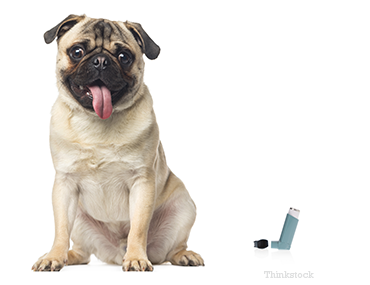
Dr. Justine Lee discusses feline asthma and asthma inhaler poisoning in dogs. For more from Dr. Lee, find her on Facebook!
Asthma, which can be seen in humans, horses, and cats, can be life threatening without treatment. In cats, clinical signs of asthma include:
- coughing (which sounds like “hacking up a hairball” in cats)
- shortness of breath
- open-mouth breathing
- exercise intolerance
- difficulty breathing
- blue gums
- acute death
In veterinary medicine, an acute asthmatic attack requires a visit to the emergency veterinarian for oxygen therapy and medications to alleviate the bronchoconstriction (e.g., constriction of the airways). Specific medications include corticosteroids (e.g., prednisolone) and lung expanders (e.g., bronchodilators such as theophylline, albuterol, etc.).
Long-term management of asthma includes the use of human asthma inhalers with a pet-specific chamber (so the drug can be delivered through a mask) called an AeroKat or AeroDawg chamber. Long-term management also includes environmental changes such as eliminating allergens (e.g., like smoke, dust, kitty litter dust, etc.) and using high-efficiency particulate air (HEPA) filters.
Most of the time, asthma can be well controlled when these changes are implemented (learn more about feline asthma).
However, before you bring home that asthma inhaler, pay heed.
 Typically, your veterinarian needs to write a prescription for an asthma inhaler (which you can fill at a human pharmacy). While the medication can be expensive (ranging from $70-110/canister), it can be life-saving and very easy to administer. However, asthma inhalers are the perfect chew toy in your dog’s eyes.
Typically, your veterinarian needs to write a prescription for an asthma inhaler (which you can fill at a human pharmacy). While the medication can be expensive (ranging from $70-110/canister), it can be life-saving and very easy to administer. However, asthma inhalers are the perfect chew toy in your dog’s eyes.
Asthma inhalers contain certain drugs (e.g., albuterol, fluticasone, etc.), are made of plastic and pliable aluminum (that’s easy to chew into), and often contain a weird, intriguing smell. If your dog accidentally chews into an inhaler containing albuterol, it can be extremely poisonous to your dog. Either a human or cat inhaler can be dangerous. Thankfully, cats typically won’t chew into asthma inhalers (due to their smaller mouth and more discriminating habits). However, when dogs chew into an asthma inhaler, one puncture can result in all of the pressurized drug being inhaled within seconds (Some of these asthma inhaler canisters containing 200 doses of drug). This causes concentrated albuterol to rapidly be absorbed from the mouth, resulting in toxic symptoms within seconds to minutes.
With an overdose, albuterol inhalers can have a stimulant effect on the heart (and lungs). When ingested by a dog, it can result in dangerous clinical signs including:
- vomiting
- agitation
- a racing heart rate
- red gums
- panting excessively
- weakness
- collapse
- hypertension
- hypotension
- severe electrolyte changes (a low potassium)
- seizures
- shock
- acute death
An immediate trip to the veterinarian or emergency veterinarian is imperative. Treatment includes aggressive IV fluids, blood work (to monitor the potassium levels), drugs to slow the heart rate down, sedation, and heart and blood pressure monitoring. With supportive care, treatment is fair to good; however, treatment can be expensive as 24/7 care is typically required.
When in doubt, prevention is key! Keep your inhalers in convenient areas, but behind cupboard doors or within a closed drawer. While these medications can be life saving for asthma, they can be dangerous with an overdose situation.
If you have any questions or concerns, you should always visit or call your veterinarian – they are your best resource to ensure the health and well-being of your pets.
![]()
